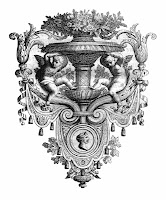ODE ON A GRECIAN URN
THOU still unravish'd bride of quietness,
Thou foster-child of Silence and slow Time,
Sylvan historian, who canst thus express
A flowery tale more sweetly than our rhyme:
What leaf-fringed legend haunts about thy shape
Of deities or mortals, or of both,
In Tempe or the dales of Arcady?
What men or gods are these? What maidens loth?
What mad pursuit? What struggle to escape?
What pipes and timbrels? What wild ecstasy?
Heard melodies are sweet, but those unheard
Are sweeter; therefore, ye soft pipes, play on;
Not to the sensual ear, but, more endear'd,
Pipe to the spirit ditties of no tone:
Fair youth, beneath the trees, thou canst not leave
Thy song, nor ever can those trees be bare;
Bold Lover, never, never canst thou kiss,
Though winning near the goal—yet, do not grieve;
She cannot fade, though thou hast not thy bliss,
For ever wilt thou love, and she be fair!
Ah, happy, happy boughs! that cannot shed
Your leaves, nor ever bid the Spring adieu;
And, happy melodist, unwearièd,
For ever piping songs for ever new;
More happy love! more happy, happy love!
For ever warm and still to be enjoy'd,
For ever panting, and for ever young;
All breathing human passion far above,
That leaves a heart high-sorrowful and cloy'd,
A burning forehead, and a parching tongue.
Who are these coming to the sacrifice?
To what green altar, O mysterious priest,
Lead'st thou that heifer lowing at the skies,
And all her silken flanks with garlands drest?
What little town by river or sea-shore,
Or mountain-built with peaceful citadel,
Is emptied of its folk, this pious morn?
And, little town, thy streets for evermore
Will silent be; and not a soul, to tell
Why thou art desolate, can e'er return.
O Attic shape! fair attitude! with brede
Of marble men and maidens overwrought,
With forest branches and the trodden weed;
Thou, silent form! dost tease us out of thought
As doth eternity: Cold Pastoral!
When old age shall this generation waste,
Thou shalt remain, in midst of other woe
Than ours, a friend to man, to whom thou say'st,
'Beauty is truth, truth beauty,—that is all
Ye know on earth, and all ye need to know.'
ODA A UNA URNA GRIEGA
Tú, todavía virgen esposa de la calma,
criatura nutrida de silencio y de tiempo,
narradora del bosque que nos cuentas
una florida historia más suave que estos versos.
En el foliado friso ¿qué leyenda te ronda
de dioses o mortales, o de ambos quizá,
que en el Tempe se ven o en los valles de Arcadia?
¿Qué deidades son ésas, o qué hombres? ¿Qué doncellas rebeldes?
¿Qué rapto delirante? ¿Y esa loca carrera? ¿Quién lucha por huir?
¿Qué son esas zampoñas, qué esos tamboriles, ese salvaje frenesí?
criatura nutrida de silencio y de tiempo,
narradora del bosque que nos cuentas
una florida historia más suave que estos versos.
En el foliado friso ¿qué leyenda te ronda
de dioses o mortales, o de ambos quizá,
que en el Tempe se ven o en los valles de Arcadia?
¿Qué deidades son ésas, o qué hombres? ¿Qué doncellas rebeldes?
¿Qué rapto delirante? ¿Y esa loca carrera? ¿Quién lucha por huir?
¿Qué son esas zampoñas, qué esos tamboriles, ese salvaje frenesí?
Si oídas melodías son dulces, más lo son las no oídas;
sonad por eso, tiernas zampoñas,
no para los sentidos, sino más exquisitas,
tocad para el espíritu canciones silenciosas.
Bello doncel, debajo de los árboles tu canto
ya no puedes cesar, como no pueden ellos deshojarse.
Osado amante, nunca, nunca podrás besarla
aunque casi la alcances, mas no te desesperes:
marchitarse no puede aunque no calmes tu ansia,
¡serás su amante siempre, y ella por siempre bella!
¡Dichosas, ah, dichosas ramas de hojas perennes
que no despedirán jamás la primavera!
Y tú, dichoso músico, que infatigable
modulas incesantes tus cantos siempre nuevos.
¡Dichoso amor! ¡Dichoso amor, aun más dichoso!
Por siempre ardiente y jamás saciado,
anhelante por siempre y para siempre joven;
cuán superior a la pasión del hombre
que en pena deja el corazón hastiado,
la garganta y la frente abrasadas de ardores.
¿Éstos, quiénes serán que al sacrificio acuden?
¿Hasta qué verde altar, misterioso oficiante,
llevas esa ternera que hacia los cielos muge,
los suaves flancos cubiertos de guirnaldas?
¿Qué pequeña ciudad a la vera del río o de la mar,
alzada en la montaña su calma ciudadela
vacía está de gentes esta sacra mañana?
Oh diminuto pueblo, por siempre silenciosas
tus calles quedarán, y ni un alma que sepa
por qué estás desolado podrá nunca volver.
¡Ática imagen! ¡Bella actitud, marmórea estirpe
de hombres y de doncellas cincelada,
con ramas de floresta y pisoteadas hierbas!
¡Tú, silenciosa forma, tu enigma nuestro pensar excede
como la Eternidad! ¡Oh fría Pastoral!
Cuando a nuestra generación destruya el tiempo
tú permanecerás, entre penas distintas
de las nuestras, amiga de los hombres, diciendo:
«La belleza es verdad y la verdad belleza»... Nada más
se sabe en esta tierra y no más hace falta.
Versión castellana de JULIO CORTÁZAR.


